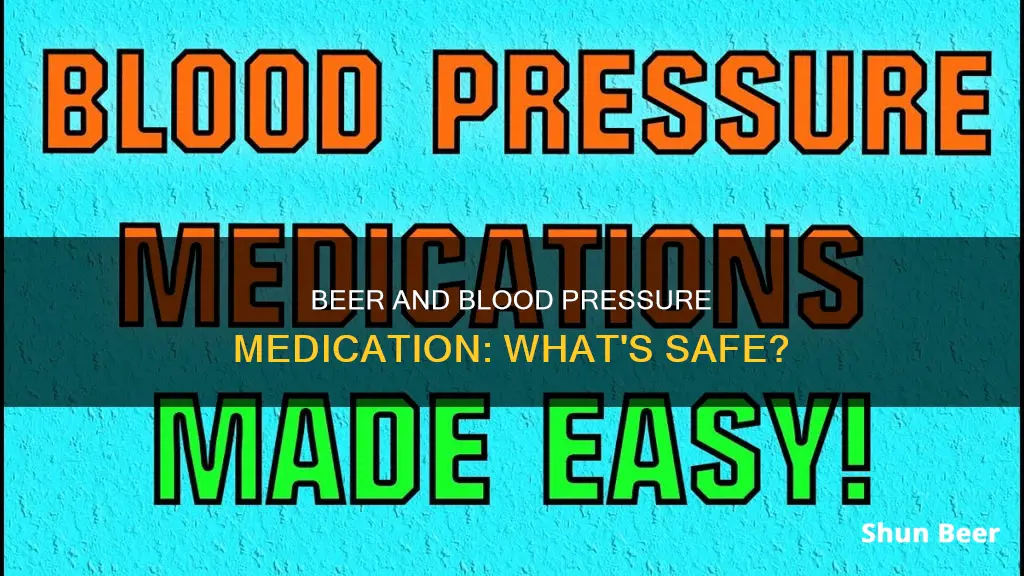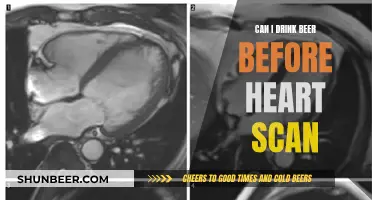
Drinking alcohol while on blood pressure medication is not recommended by healthcare professionals. Alcohol can cause high blood pressure and may negatively interact with blood pressure medication, causing side effects such as dizziness, drowsiness, fainting, and a fast heart rate. If you are taking blood pressure medication, it is important to consult with your doctor or healthcare provider about whether it is safe to consume alcohol.
| Characteristics | Values |
|---|---|
| Can you drink beer while on blood pressure medication? | It is not recommended to drink alcohol while taking blood pressure medication. However, it may be safe to have a drink occasionally, but only a medical provider can tell you if it's safe to do so. |
| Why is it not recommended? | Alcohol can increase the effects of blood pressure medication, causing blood pressure to drop too low (hypotension). This can lead to dizziness, fainting, drowsiness, and an increased risk of falling and injuries. |
| How does alcohol affect blood pressure? | Regular alcohol intake can lead to high blood pressure. Alcohol is also broken down in the liver, which can change the way the body metabolizes medication, potentially increasing the effects of the medication. |
| What are the risks of mixing alcohol with blood pressure medications? | Drinking alcohol while on blood pressure medication can cause heart rhythm problems (arrhythmias), upset stomach, nausea, vomiting, severely low blood pressure, and liver problems (jaundice). |
| Are there any safe alternatives? | The U.S. Dietary Guidelines for 2020-2025 consider moderate drinking for men to be two alcoholic drinks per day or less and one drink or less per day for women. However, even moderate drinking may worsen blood pressure problems, so it is essential to consult a healthcare professional. |
What You'll Learn
- Alcohol and blood pressure medication can cause orthostatic hypotension
- Mixing alcohol with medication can cause dizziness, fainting, drowsiness and a fast heart rate
- Drinking alcohol while taking blood pressure medication can lead to a fall or injury
- Alcohol can cause high blood pressure
- Alcohol can affect how the liver breaks down medication

Alcohol and blood pressure medication can cause orthostatic hypotension
Orthostatic hypotension is defined as a drop in systolic blood pressure of 20 mmHg or an absolute systolic blood pressure of less than 90 mmHg and/or a diastolic blood pressure drop of 10 mmHg within 3 minutes of standing. It is a recognised risk factor for adverse outcomes such as syncope, falls, cognitive impairment, and mortality.
When you mix alcohol with certain blood pressure medications, such as vasodilators and alpha-blockers, you may experience orthostatic hypotension due to the combined effects of alcohol and the medication on blood pressure. Alcohol itself can lower blood pressure, and when combined with blood pressure-lowering medications, it can lead to a more significant drop in blood pressure.
Additionally, alcohol can affect liver enzymes, altering drug levels in the bloodstream and potentially worsening side effects or reducing the effectiveness of the medication. It is important to consult with a healthcare provider to determine if it is safe to consume alcohol while taking blood pressure medication.
To reduce the risk of orthostatic hypotension, it is recommended to avoid alcohol, increase fluid intake, wear compression stockings, and move slowly when changing positions from lying down or sitting to standing.
Should You Drink Beer Sediment?
You may want to see also

Mixing alcohol with medication can cause dizziness, fainting, drowsiness and a fast heart rate
Mixing alcohol with medication can have serious consequences, including dizziness, fainting, drowsiness, and a fast heart rate. These side effects can be dangerous and may lead to accidents or falls, which can result in injuries.
Dizziness and drowsiness can impair your balance and coordination, increasing the risk of falling. Fainting can also lead to falls and injuries, especially for older individuals. Additionally, a fast heart rate can be concerning, particularly for those with heart conditions.
The combination of alcohol and blood pressure medication can enhance these side effects. Alcohol itself can cause a drop in blood pressure, and when mixed with certain medications, such as vasodilators and alpha-blockers, it can lead to orthostatic hypotension. This condition occurs when an individual stands up from a sitting or lying down position and experiences a significant drop in blood pressure, resulting in dizziness, lightheadedness, or fainting.
Furthermore, alcohol can affect liver enzymes, altering drug levels in the bloodstream. This can either worsen medication side effects or reduce the effectiveness of the medication. It is crucial to consult a healthcare provider to understand the potential risks and interactions between alcohol and your specific medication.
To mitigate these risks, it is generally recommended to avoid alcohol while taking blood pressure medications. If occasional alcohol consumption is approved by a healthcare provider, it is essential to follow their guidance and consume alcohol in moderation.
Diabetics and Alcohol: Wine and Beer Guidelines
You may want to see also

Drinking alcohol while taking blood pressure medication can lead to a fall or injury
The combination of alcohol and blood pressure medication can also cause orthostatic hypotension, which is a sudden drop in blood pressure when standing up from a sitting or lying down position. This can lead to dizziness, lightheadedness, or fainting, which can also increase the risk of falling.
Additionally, alcohol is broken down in the liver, which is also responsible for breaking down medications. When alcohol is consumed with medication, it can slow down the clearance of the medication from the body, leading to higher levels of the drug in the system. This can result in stronger effects of the medication, including a more significant drop in blood pressure.
The risk of falling and sustaining an injury is particularly high for older individuals who are taking blood pressure medication and consuming alcohol. Even a small amount of alcohol can increase the risk of a dangerous fall or injury for this population.
Furthermore, alcohol can generally lead to higher blood pressure, which is the condition that blood pressure medications are intended to treat. Regular alcohol intake can make it more challenging to manage hypertension effectively.
It is essential to consult with a healthcare provider before consuming alcohol while taking any blood pressure medication to ensure there are no serious drug interactions and to determine if it is safe to drink at all. The safety of drinking alcohol while on blood pressure medication depends on various factors, including medical history, age, and other medications being taken.
Ozark Beer Choices: What the Characters Drink
You may want to see also

Alcohol can cause high blood pressure
Regular alcohol intake can lead to high blood pressure. Alcohol is metabolized in the liver, which means it can change the way the body breaks down medication. Alcohol can increase the effects of blood pressure medication, making it seem like you have taken a higher dose. This could result in a more significant drop in blood pressure, causing dizziness, fainting, and problems with normal heart rhythm. In some cases, this can be very serious.
Alcohol can also lead to weight gain, which may further cause high blood pressure or heart disease. Additionally, liver enzymes are responsible for how medications are changed in the body before they are excreted. Alcohol can affect these liver enzymes and alter drug levels in the bloodstream, making medication side effects worse or lowering the effectiveness of the medicine.
The effects of alcohol on blood pressure appear to be mainly due to alcohol consumed in the few days immediately before the blood pressure measurement. High recent alcohol intake significantly raised systolic and diastolic blood pressure in both men and women.
If you are taking blood pressure medication, it is important to ask your doctor before consuming alcohol.
Drinking and Driving: One Beer, Safe to Drive?
You may want to see also

Alcohol can affect how the liver breaks down medication
Alcohol can have a detrimental impact on how the liver breaks down medication. The liver is responsible for breaking down and filtering out harmful substances in the blood, such as drugs and toxins, and converting them into water-soluble forms that can be excreted through bile and urine. It also manufactures proteins, enzymes, and hormones that are essential for maintaining health and preventing infections.
When alcohol is consumed, the liver prioritises breaking it down, which can interfere with the normal metabolism of medications. Alcohol is processed by the liver, and if there is an excessive amount, it can slow down the clearance of certain drugs from the body. This means that higher levels of the drug remain in the body for longer, potentially leading to stronger effects or side effects. In the case of blood pressure medications, this interference can result in a more significant drop in blood pressure, increasing the risk of dizziness, fainting, and unstable blood pressure levels.
Additionally, alcohol can affect the liver enzymes responsible for breaking down medications. These enzymes play a crucial role in the complex process of drug metabolism. By altering the levels of these enzymes, alcohol can change the way medications are processed and affect the concentration of drugs in the bloodstream. This can either enhance or reduce the effectiveness of the medication, leading to unexpected side effects or a decrease in the drug's therapeutic benefits.
The combination of alcohol and certain blood pressure medications can also increase the risk of adverse effects on the liver itself. Alcohol abuse is a known cause of liver damage, including conditions such as cirrhosis, hepatitis, and liver cancer. When mixed with blood pressure medications, the additional burden on the liver can further increase the risk of liver-related problems. Therefore, it is essential to consult a healthcare provider before consuming alcohol while taking any medication, including blood pressure drugs, to ensure safe and effective use.
Beer Consumption and Nephritis: What's the Safe Limit?
You may want to see also
Frequently asked questions
It is not recommended to drink beer or any other form of alcohol while taking blood pressure medication. Alcohol can increase the effects of blood pressure medicine, causing your blood pressure to drop too low, which can be dangerous.
Drinking alcohol while taking blood pressure medication can increase your risk of experiencing side effects such as dizziness, drowsiness, fainting, and heart rhythm problems. It can also make it harder for your medication to work effectively.
The amount of alcohol that is safe to drink will depend on your individual circumstances, including your medical history, age, and any other medications you are taking. It is important to speak to your doctor or healthcare provider to determine if it is safe for you to consume alcohol while taking blood pressure medication.







